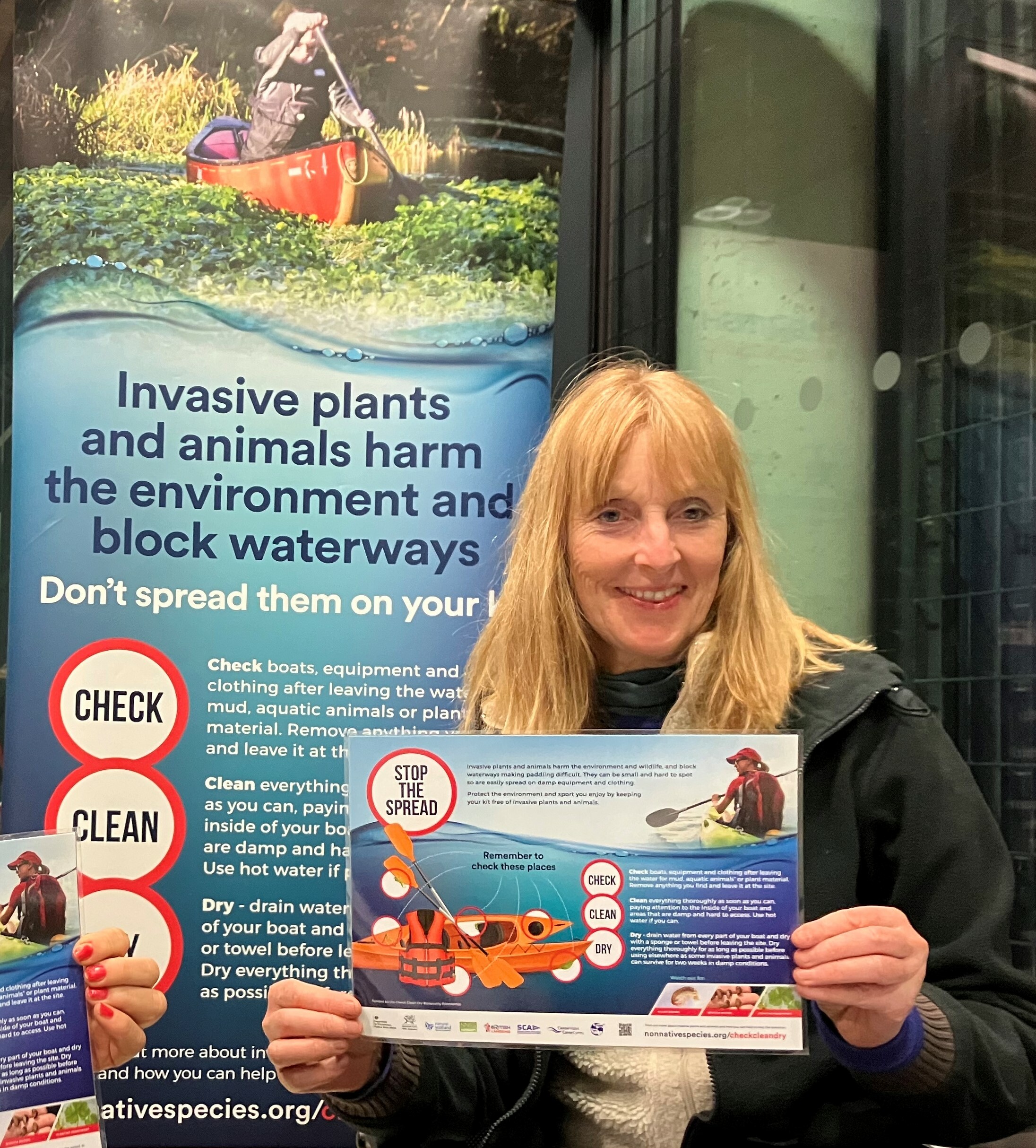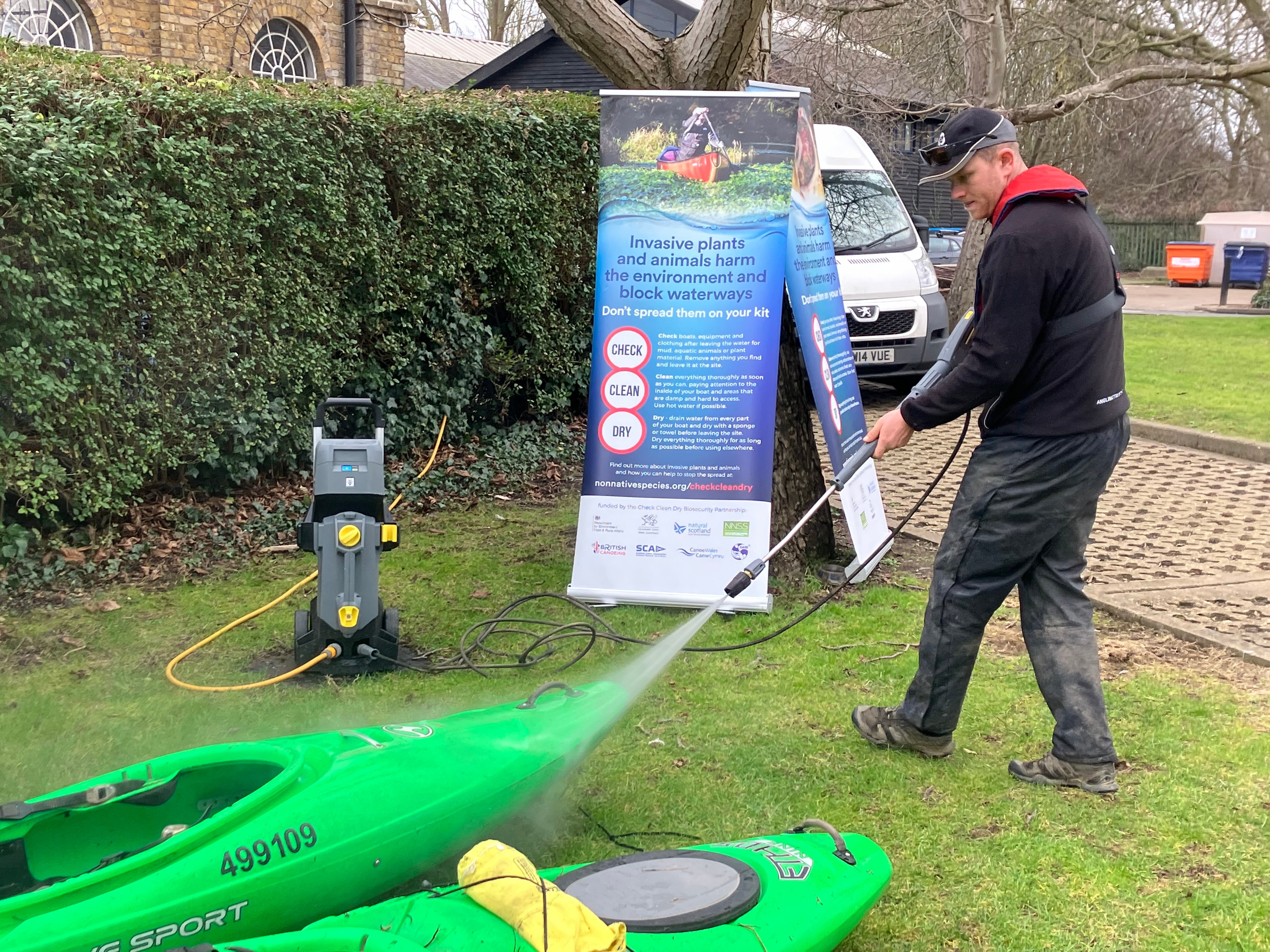May 2023
Floating pennywort is spoken about a lot in British Canoeing’s office. It is the bane of our lives. The plant clogs waterways, ruining the paddling experience. But it also can result in the loss of oxygen, killing species beneath the water.
We’ve got numerous non-native species across the country and the key danger is that they can be transported easily.
Some of them, like floating pennywort, are very small. With lots of the plants, it only requires a small bit of leaf, node or stem and they can very quickly regrow.
But the other issue to remember is that there’s lots of other species that can potentially create an issue or problem. As a water user you have to be ‘biosecure’ to protect the environment.
We all have to be diligent. If you are a paddler, boater, swimmer, angler, you have to make sure you are not taking anything from the waterway you’ve been using.
With floating pennywort, it is so important to wash off boats and even power wash stand up paddleboards. Even then, what if you leave the site and fail to check your shoes or boots? There could be fragments of native plant species within the tread of your boots.
We’ve already got a problem, taxpayers are spending £1.7 billion a year on just managing, not controlling, invasive species and that’s unsustainable. We’ve got to find a better solution and biosecurity if done correctly, is that solution.
Check, clean, dry
With the check, clean, dry process… The first step is checking your kit as a whole, visually, making sure there’s nothing obvious on it, like a node of plant or an invertebrate.
The next stage is then cleaning it. If you’ve got a larger item, use a pressure washer, if you can.
With angling equipment, you might look at using a conventional disinfectant product to thoroughly clean the kit.
Finally, dry. British Canoeing recommends thoroughly drying your kit because that’s a way of killing off many non-native species, as well as bacteria and viruses.
The public needs to be aware and understand how long these species can survive outside their normal environment. As a paddler, your kayak could have invasive species on it after leaving the water. They could still be alive when you reintroduce your boat two weeks later or even longer.
The good news is that what we're seeing is an improvement in getting the message out and raising public awareness. A lot of that has come from support and partner organisations which is great to see.
Public awareness is massive. It provides volunteer support but also with reporting what we know about invasive species in terms of their presence and location.
We have been able to work on six waterways across England managing floating pennywort, which could not be achieved without volunteer support or collaboration between organisations.
As soon as you identify an issue, the sooner British Canoeing and our partners can deal with it. If it’s a few years down the line and that species has had an opportunity to spread and become more prevalent then it’s always going to be harder to deal with and more expensive. Prevention is always better than management!
Whether it’s your boots, wetsuits, dry suits, making sure any of that is as clean as it can be when you take it off site. When you get home in a safe environment, finish it off, make sure it’s absolutely right. Hang it out and with UV light, within a couple of days, you’re safe to go out.
British Canoeing and the Angling Trust are working with the Environment Agency, Thames Water and the Canal and River Trust, to tackle the floating pennywort problem.
We have some volunteer days coming up to remove it from the area of Enfield Lock, in the Lee Valley area. It is part of our Lee Valley Social Impact Project ahead of the ICF Canoe Slalom World Championships, at Lee Valley White Water Centre, in Waltham Cross, in September.
For the dates and how to sign up, please visit: https://britishcanoeing.formstack.com/forms/floati...
Finally, here’s some of our recent films about biosecurity and volunteering:
https://youtu.be/smF-r4fEv3A
https://youtu.be/G8jbal_AFJE
Pippa Rowlandson is Environment Project Officer at British Canoeing.
Follow: @BritishCanoeing
The opinions expressed in this blog are the authors' and not necessarily those of the wider Link membership.


Latest Blog Posts